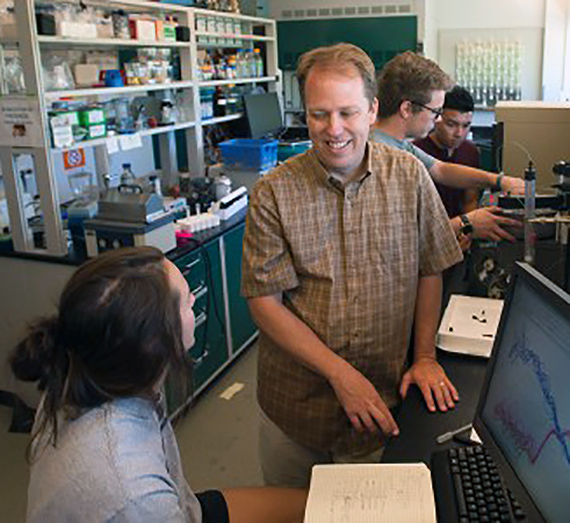Keck Grant Advances Students' Skills

(Above) Professor Jeff Watson talks with Mikayla Anderson as Matthew Clark and Khoi Ha work in the background in a Gonzaga science lab.
Gonzaga News Service
SPOKANE, Wash. — A $250,000 grant from the W.M. Keck Foundation will prepare more Gonzaga biology, biochemistry and chemistry majors with crucial research laboratory skills by integrating the pilot Linked Experimental System (LES) model into the curriculum.
The LES is a novel pedagogical tool that links multiple science teaching laboratory courses through a common experimental system. The linked system will provide more students with opportunities to explore science firsthand through original research, critical analysis, and dissemination of results through presentations and publications. The system combines the impact of a teaching lab with the depth of a research lab and will allow Gonzaga to maximize its resources to provide more students with the most modern research experiences possible.
With the grant, Gonzaga intends to expand the LES — currently in the pilot phase — throughout the sciences and eventually to other disciplines. The linked system offers numerous benefits uncharacteristic of traditional teaching labs by promoting multidisciplinary learning, offering opportunities for scientific experiments over extended time frames, and allowing student researchers to learn from and expand upon the work of previous cohorts.
As the pilot model develops, students in Gonzaga's biochemistry laboratory will study a particular enzyme, its structure and its function. When these students move into molecular biology laboratory the next semester, they will study the regulation and expression of the gene for this enzyme in its physiological context. As one cohort of students moves through the linked courses, the LES makes their results available to the next cohort of students, who learn from and build upon previous work.
In the molecular biology lab, the LES will allow students to explore the effects of gene knockouts, or produce mutants that are predicted to affect gene regulation.
"In this fashion, our teaching laboratory courses will more effectively model an undergraduate research environment and provide more students with the key skills and experiences that come with undergraduate research," said Jeff Watson, Gonzaga chemistry and biochemistry assistant professor, who teaches the biochemistry lab and is the project leader.
Gonzaga will continually assess the linked system to ensure it's achieving learning goals of helping students become more adept at developing unique research questions, communicating science through their writing, and planning and designing experiments.
The University anticipates three LES modules will be implemented in the next five years in biology, chemistry and biochemistry. The grant will allow Gonzaga to acquire equipment and software to be used across the biology, chemistry and biochemistry curricula to fully develop the pilot project. The equipment and software will be used in multiple courses beyond the pilot project and will facilitate expansion of the model into other areas of the curriculum.
Workshops for faculty in biology, chemistry and biochemistry are anticipated in spring and fall of 2015 to encourage and assist further development of the linked system in more courses and lab modules. Similar workshops for faculty across the University are expected in spring 2016.
Other key faculty involved in the leading the project are: Mia Bertagnolli, professor and chair of the department of biology; Carla Bonilla, assistant professor of biology; and Jennifer Shepherd, professor and chair of the department of chemistry and biochemistry.
Based in Los Angeles, the W. M. Keck Foundation was established in 1954 by the late W. M. Keck, founder of the Superior Oil Company. The foundation's grant making is focused primarily on pioneering efforts in the areas of medical research, science and engineering and undergraduate education.
